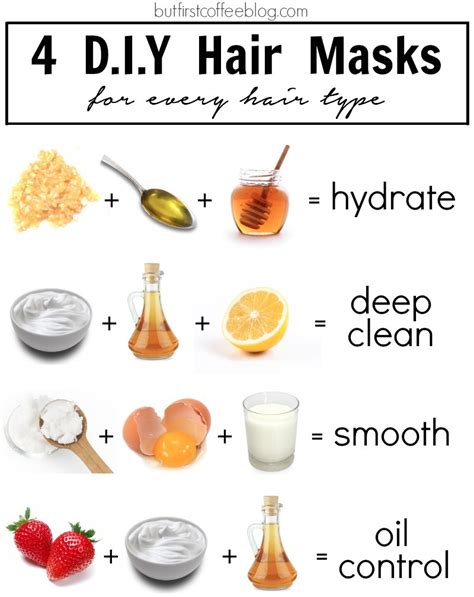Introduction:

Indulge in the luxury of healthy, radiant hair without the hefty salon price tag. By crafting your own bespoke hair masks using natural and effective ingredients, you can elevate your haircare routine and achieve salon-worthy results in the comfort of your own home.
According to a study by the American Academy of Dermatology, hair masks can profoundly impact hair health. They provide deep conditioning, nourishment, and protection, transforming dull and damaged locks into vibrant, healthy tresses.
Types of Hair Masks:
- Hydrating Masks: Ideal for dry, moisture-deprived hair, offering intense hydration and nourishment.
- Protein Masks: Strengthen and repair damaged hair, restoring its elasticity and shine.
- Volumizing Masks: Enhance hair volume and create a fuller, bouncier look.
- Clarifying Masks: Deeply cleanse and remove excess oils, product buildup, and impurities.
Benefits of DIY Hair Masks:
- Customized Solutions: Tailor the masks to your specific hair needs and concerns.
- Cost-Effective: Save money compared to salon treatments.
- Convenience: Create and apply masks at home, saving time and effort.
- Natural Ingredients: Avoid harsh chemicals and parabens found in commercial hair masks.
1. Assess Your Hair Type
Identify your hair type (dry, oily, sensitive, etc.) to determine the appropriate ingredients for your mask.
2. Choose Your Ingredients
Natural Remedies for Hair Masks:
| Ingredient | Benefits |
|---|---|
| Avocado | Nourishes, hydrates, and repairs |
| Honey | Antibacterial, moisturizing, and strengthens |
| Coconut Oil | Conditions, promotes growth, and adds shine |
| Aloe Vera | Soothes, hydrates, and reduces inflammation |
| Yogurt | Protein-rich, strengthens, and adds volume |
Other Beneficial Ingredients:
- Argan Oil (for dry hair)
- Castor Oil (for hair growth)
- Tea Tree Oil (for dandruff)
- Apple Cider Vinegar (for clarifying)
- Banana (for hydration)
3. Create Your Mask
Combine the chosen ingredients in a bowl and mix thoroughly. Adjust proportions as needed to achieve a smooth, spreadable consistency.
4. Apply and Rinse
- Apply the mask evenly to damp hair.
- Cover with a shower cap or warm towel to enhance absorption.
- Leave on for the recommended time (typically 20-30 minutes).
- Rinse thoroughly with lukewarm water and follow with shampoo and conditioner.
1. Dry and Damaged Hair
- Avocado and Honey Mask: Mash avocado with honey and apply to dry, rough hair.
- Coconut Oil and Castor Oil Mask: Combine equal parts coconut oil and castor oil and massage into hair, focusing on split ends.
2. Oily Hair
- Apple Cider Vinegar and Yogurt Mask: Mix apple cider vinegar with plain yogurt and apply to the scalp. Leave on for 15 minutes before rinsing.
- Tea Tree Oil and Coconut Oil Mask: Add a few drops of tea tree oil to coconut oil and massage into the scalp. Leave on for 20 minutes before rinsing.
3. Thin and Limp Hair
- Banana and Yogurt Mask: Puree a banana and mix with plain yogurt. Apply to hair and leave on for 30 minutes before rinsing.
- Egg and Honey Mask: Whisk together an egg with honey and apply to hair, focusing on the roots. Leave on for 15 minutes before rinsing.
4. Dandruff
- Tea Tree Oil and Aloe Vera Mask: Add a few drops of tea tree oil to aloe vera gel and apply to the scalp. Massage gently and leave on for 30 minutes before rinsing.
- Coconut Oil and Apple Cider Vinegar Mask: Combine coconut oil with a few drops of apple cider vinegar and apply to the scalp. Leave on for 20 minutes before rinsing.
- Use high-quality, fresh ingredients for optimal results.
- Apply masks to clean, damp hair for better absorption.
- Leave masks on for the recommended time to allow ingredients to penetrate.
- Rinse masks thoroughly to avoid product buildup.
- Test any new mask on a small patch of skin before applying it to your entire hair.
- Use hair masks regularly (once or twice a week) to maintain healthy hair.
- Overusing hair masks can lead to product buildup and weigh hair down.
- Applying masks to dry hair can cause breakage.
- Leaving masks on for excessive time can cause irritation and damage.
- Using harsh ingredients can strip hair of its natural oils.
- Not rinsing masks thoroughly can result in product buildup and dandruff.
Conclusion:
Embrace the transformative power of DIY hair masks to achieve salon-quality results without the expense. By customizing masks to suit your specific hair needs, you can restore the vitality and radiance of your hair from the comfort of your own home. Remember to follow these tips and avoid common mistakes to optimize the benefits of your homemade hair masks. With a little creativity and effort, you can unlock the secret to healthy, beautiful hair that turns heads wherever you go.
